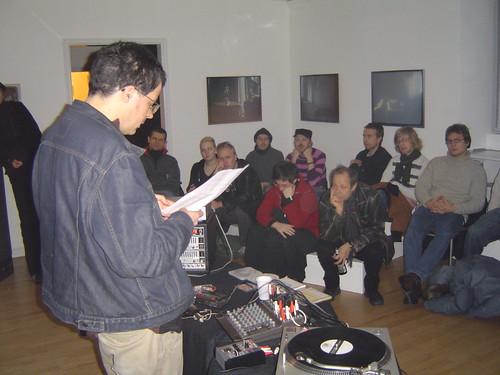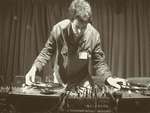The Scratching Artist
 Stefan Beck speaking at Galeri21, Malmö
Stefan Beck speaking at Galeri21, Malmö
From a lecture held at Galeri21, Malmö
What is it that makes modern noise music so different, so appealing?
It's the DJ!
The answer is quick, but not so obvious, for there's hardly a DJ found who plays noise music.
So we have to look first of all at what a DJ is doing. What is his function?
A DJ is normally about playing records, and this is fundamentally different from playing an instrument.
An instrument is for making music, a tool of production.
A turntable is for making music out of music, a tool of reproduction, a meta-maschine.
In its normal state an instrument is dead, you have to do something with it.
The turntable in its normal state is alive, it wants to play the record from beginning to the end, in a way it's an ideal infinite maschine. By its inherent limits of construction however it was quite conclusive to use another a second turntable to allow continouus playing, a function which can be achieved nowadays with CDs and loop functions.
To turn a turntable in an instrument you have to stop it!
That's where the scratching comes in (or any other manipulation).
In the beginning scratching was a means to keep the turntable in its normal state, an actual infinite loop maschine.
But this is done nowadays by samplers or other fileplayers. The turntable isn't necessary any more for reproducing music.
The turntable is only useful as a tool for producing new music.
It took a while to realize that the scratch or other manipulation of a turntable is an element in its own right.
No more a loop maschine, but a way of exploring music on music, sound on sound, time on time, rhythm on rhythm. Or we can say that looping has been taken to a different level. Not the material is looped but the process on the material. This is called feedback, which is on the same hand a prime source of noise.
If we look a little bit closer at the scratch we'll find it first of all as a msitake. You're not supposed to handle a record, a turntable like this.
It's basic features can be described as interrupt and wreckage. It stops the normal play of the music, and it destroys the natural prerecorded sound, distorts it into something unrecognizable. (At the beginning we didn't know what scratching was, how it was achieved, -> russian tape recorders; still don't know; the scratch is an alien, a stranger)
You cannot scratch a scratch again. The scratch is always on something (meaningful), and not on nothing, the scratch itself is nothing. The scratch is a stranger because it is based on something familiar, otherwise it would just leave you cool.
The scratch is also a mess, but the mess is a distinct sound.
It has been observed that there is nothing but "I want to listen to noise...."
Such a statement leads to paradoxas, aporias, deterritorialised fields, sown with calderas.
First, noise has to be avoided, technically, socially. Noise is chaos in itself, it's against any order. And this cannot be allowed. Music is about order, organizing sounds on rules.
It is owed to Heidegger that we have a clearer picture of noise: as he observed in 'Sein und Zeit' we hardly perceive pure noise (Geräusch). We listen to the 'car', the 'plane', even the 'drum', the 'piano' - things, or more general facts. To get the noise by itself we have to draw back our ears from the things, listen abstractly. ("Um ein reines Geräusch zu hören, müssen wir von den Dingen weghören, unser Ohr davon abziehen, d.h. abstrakt hören.")
So in a strict sense there is no noise. If you percieve something as noise you already made a judegement on its nature, file it into an order. So noise is probably not-noise = sound.
In the context of music there is no such thing as pure noise, for it would mean that there's possibly no music.
The scratching noise is the indictator of possibly no music. And no music is a desired escalation of music.
Scratching records is a way of making these contradictions audible. And the scratching artist is a wanderer, a nomade in this field of sound disrupture.
The regular DJ you'll find in the clubs is a jukebox, transporting the questionable ideal of seamless play and sound. Disguising the twin nature of the turntable(negates the idea of the turntable as instrument). His sticking to it is only but nostalgic; could be as well achieved by CDs or laptops.
He's nevertheless with one step in the future for he has further developped the original idea of scratching the records into a perfect continuous sound stream.
The scratching artist is both in the past and the future, for he goes back to the humble beginings when scratching was an improper means of creating seamless loops, sticks to the scratch to apply a special nature in its own rights to it, yet still believes in the idea of the turntable as a meta-maschine for producing new from old.
Welcome to RetroFuture!
Similar Pages


